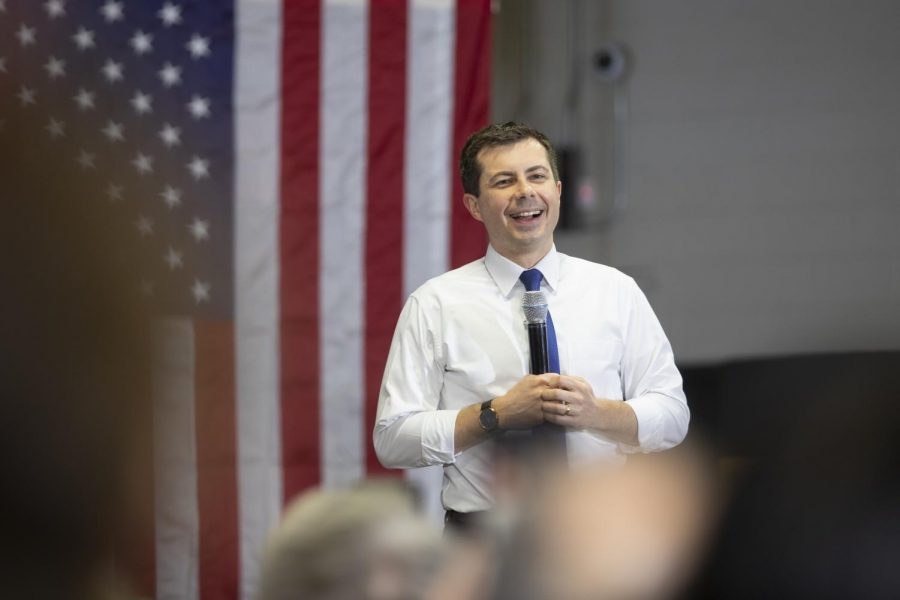Opinion: #MayorCheat didn’t happen, but our democracy is still broken
There isn’t sufficient evidence that the Iowa caucuses were intentionally mismanaged, but the response to the mayhem reveals a much deeper problem in American politics.
February 9, 2020
A week removed from the Iowa caucuses, and we’re still in disarray.
Many Democrats remain outraged by the Iowa Democratic Party’s actions, including those who competed for support in the caucuses. Rep. Tulsi Gabbard of Hawaii has called for Democratic National Committee Chair Tom Perez to resign. Even former Vice President Joe Biden has cast doubt on the results.
With a mess this bad, it makes sense that many people would start creating conspiracy theories about what “really” happened. While these claims are definitionally unfounded, they have the potential to unravel the party’s primary mission of defeating President Trump. One of the theories has found particular traction online: #MayorCheat.
When the conspiracy theory was made
#MayorCheat was trending on Twitter in wake of the mayhem. Allegations circulated that former South Bend, Indiana Mayor Pete Buttigieg — who in a razor-thin margin against Sen. Bernie Sanders, I-Vt., received more state delegate equivalents in the Iowa caucuses — was somehow involved with planning the breakdown of the app to slither his way into winning the Hawkeye State.
I’m usually the last person to get on board with a conspiracy theory. I’m a journalist; I need claims to have evidence before jumping to conclusions. But given the stakes of the caucuses, I looked into the “Buttigieg stole Iowa” hypothesis.
How it works
It starts with the app. The Iowa Democratic Party commissioned campaign technology company Shadow Inc. (literally a shady name) to build an app that would digitize the caucus precinct reporting system.
According to Federal Election Commission filings, the Buttigieg campaign paid Shadow twice for a total of $42,500. The filing description of both payments says the money was for “software rights and subscriptions.”
Shadow was also paid by a super PAC (every good conspiracy theory needs a super PAC) called For Our Future. According to the Open Secrets report on the group, For Our Future has not contributed to a party or campaign in the 2019-20 cycle. It’s just sitting there, hoarding money for some vague, nefarious reason.
And if that isn’t convincing, Shadow’s CEO worked on the presidential campaign for former Secretary of State Hillary Clinton. See? It all works together. See?
Why it doesn’t
If the above theory seems a little rabbithole-ish and doesn’t really make sense, that’s because it doesn’t.
In those same FEC filings, one can see that another presidential campaign also paid Shadow, this one for Biden.
Ah, another establishment figure trying to preserve the status quo. But if the “establishment” was trying to rig the election, wouldn’t they have done it to help Biden?
There’s also a third presidential candidate who had a history with Shadow, Sen. Kirsten Gillibrand of New York. (It’s understandable if you forgot she ran for president.) And Shadow has also done work with the Democratic state parties in Wisconsin, Nevada, and Texas.
It’s much more likely that Shadow is just another company. They were only given a couple of months to throw the app together, it wasn’t well-tested, and its flaws showed on caucus night.
What it says about our struggling democracy
Obviously, random people online aren’t representative of the American public, but #MayorCheat gets at a deeper problem in our politics.
I’ve written before about the importance of competent election administration. It’s unacceptable that, for whatever reason, we didn’t have at least some official results on caucus night. Even though the Iowa Democrats’ failure was probably unintentional, it’s already done damage to our institutions.
Democracy only works with participation and trust.
Of course, we’re far from the sham elections in the Soviet Union or Nazi Germany, but the U.S. needs all the legitimacy it can get. We live in a world where it’s clear Russia interfered in the 2016 presidential election; there isn’t a lot of room for even the most honest mistakes.
Combine that with the caucus chaos and the wariness many Democrats feel toward their party’s elite, and their disillusionment hardens.
A party this disorganized won’t defeat Trump. And that’s far scarier than any conspiracy theory.
Columns reflect the opinions of the authors and are not necessarily those of the Editorial Board, The Daily Iowan, or other organizations in which the author may be involved.



